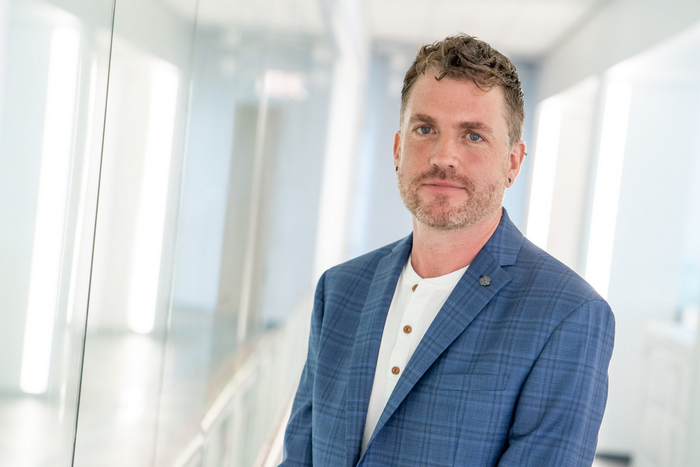James Smyth, associate professor at the Fralin Biomedical Research Institute at VTC, has been awarded a five-year, $2.7 million grant from the National Institutes of Health to discover why viruses that normally infect our lungs can turn deadly when they infect the heart.

Credit: Photo by Clayton Metz for Virginia Tech.
James Smyth, associate professor at the Fralin Biomedical Research Institute at VTC, has been awarded a five-year, $2.7 million grant from the National Institutes of Health to discover why viruses that normally infect our lungs can turn deadly when they infect the heart.
Heart disease remains the leading cause of death in the United States. Inflammation of the heart due to infection, called myocarditis, is responsible for 42 percent of all sudden deaths in young adults and is a significant cause of death in infants and children.
Inflammation occurs when our immune systems act to shut down an infection, and most of what is understood regarding how the heart is affected during viral myocarditis has historically focused on such responses.
Smyth is taking a different approach. He is looking at the virus to discover what is happening during infection prior to inflammation. His team has identified alterations in the heart, caused by the virus prior to an immune response, that can lead to deadly arrhythmias.
“Right now, we don’t understand why certain viruses infect the heart or what they do at the molecular level that leads to arrhythmias,” Smyth said. “This work will investigate and shed new light on how viral infection of heart muscle actually leads to sudden cardiac arrest.”
Smyth’s laboratory at the Fralin Biomedical Research Institute examines how heart cells communicate with one another to keep the heart beating.
Gap junctions are one of the most important mechanisms of communication between heart cells. They are responsible for electrically connecting cardiac muscle cells, which in turn produce a healthy, beating heart.
But when a virus targets cells in our body, tampering with gap junctions, it interferes with the heart’s electrical system, creating irregular heartbeats and sometimes triggering sudden cardiac death.
In addition to providing electrical signals in the heart, gap junctions allow cells to communicate. That includes alerting each other, and the immune system, to viral infection.
Smyth’s team will investigate how viruses evolve to target this biology in order to evade the immune response.
According to Smyth, certain viruses typically target the respiratory system. Through targeting gap junctions and replicating cells lining the lung, they cause only minor irritation in the lungs that results in a cough. However, when they enter and infect the heart, the same process of stopping gap junction function can turn fatal.
The study includes work being conducted in the institute’s state-of-the-art Biosafety Level 3 facility, which is used to study infectious agents or toxins that may be transmitted through the air.
In order to understand at a molecular level how viruses wreak havoc on the cardiac landscape, Smyth has teamed up with Steven Poelzing, Samy Lamouille, and Sharon Swanger of the Fralin Biomedical Research Institute. Team members are drawing on their specialties in electrophysiology, cancer biology, and neuroscience to help inform preventative and therapeutic treatment.
“Can we intervene? Can we prevent progression to this disease state? But also, can we diagnose quickly individuals who have these particular viruses infecting their hearts and can we treat them and save their lives?” Smyth said.
Smyth, who is also an associate professor in the Department of Biological Sciences in the College of Science, is recruiting team members, including a research associate and a postdoctoral associate, to join his research team at the Fralin Biomedical Research Institute.




